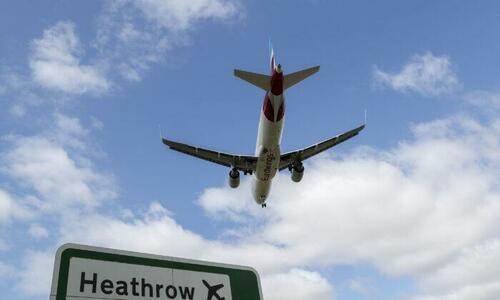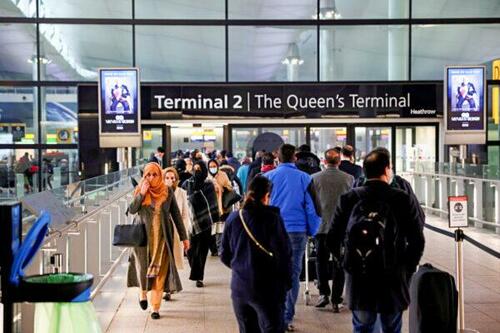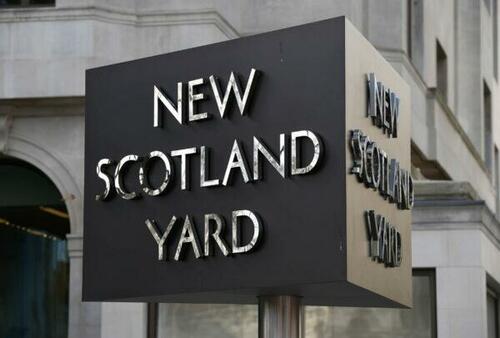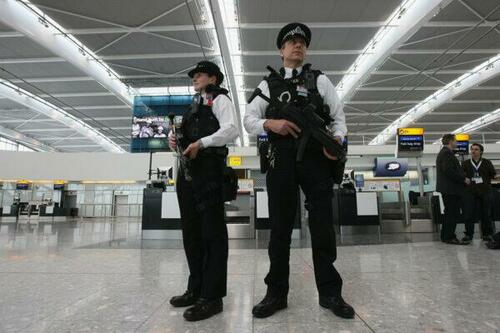Authored by Alexander Zhang via The Epoch Times,
A man has been arrested under terrorism laws after traces of uranium were found in a cargo package at Heathrow Airport, police said.

Uranium was detected in a package at the airport on Dec. 29, London’s Metropolitan Police confirmed on Jan. 11.
The man, who is in his 60s, was arrested after counter-terror officers searched an address in Cheshire on Saturday.
He was arrested on suspicion of an offence under Section 9 of the Terrorism Act 2006, which covers the making and possession of radioactive devices.
He has been released on bail until April, the Metropolitan Police said on Sunday, adding that there does not appear to be any direct threat to the public.

People queue to enter Terminal 2 at Heathrow Airport, London, on Jan. 18, 2021. (Henry Nicholls/Reuters)
According to the Sun newspaper, which first reported the incident, the package had originated from Pakistan and arrived in the UK on a flight from Oman. The uranium was found in a shipment of scrap metal, according to the BBC.
Uranium can be used for civilian power generation and scientific purposes and is a key ingredient in nuclear weapons. Certain isotopes emit radiation that can be harmful to humans, and the metal itself is toxic if ingested or inhaled.
‘Very Small Amount’
Police stressed that the amount of uranium detected was “very small.”
Commander Richard Smith, who leads the Met’s Counter Terrorism Command, said: “The discovery of what was a very small amount of uranium within a package at Heathrow Airport is clearly of concern, but it shows the effectiveness of the procedures and checks in place with our partners to detect this type of material.
“Our priority since launching our investigation has been to ensure that there is no linked direct threat to the public. To this end, we are following every possible line of inquiry available to us, which has led us to making this arrest over the weekend.
“I want to be clear that despite making this arrest, and based on what we currently know, this incident still does not appear to be linked to any direct threat to the public. However, detectives are continuing with their inquiries to ensure this is definitely the case.”

Undated photo showing the New Scotland Yard sign outside the Metropolitan Police headquarters in London. (Kirsty O’Connor/PA Media)
On Jan. 10, after the incident was reported in the press, Smith said, “I want to reassure the public that the amount of contaminated material was extremely small and has been assessed by experts as posing no threat to the public.”
“Although our investigation remains ongoing, from our inquiries so far, it does not appear to be linked to any direct threat. As the public would expect, however, we will continue to follow up on all available lines of inquiry to ensure this is definitely the case,” he added.
He added that the incident “does highlight the excellent capability” of UK police and other security agencies to monitor the country’s ports and borders “in order to keep the public safe from any potential threats to their safety and security that might be coming into the UK.”
Giving evidence at the Police and Crime Committee of the London Assembly on Jan. 11, Smith said that it was “understandable” that media reports on the incident would attract “considerable attention and potentially concern.”
He said: “The circumstances are that in the course of routine scanning at London Heathrow an element of cargo was identified that was emitting a radioactive signal. There are procedures in place to deal with these sorts of incidents and those procedures were enacted. As part of that, the counter-terrorism commands were contacted and have opened an investigation into the surrounding circumstances.”

Armed police officers patrol the new Terminal 5 at Heathrow Airport prior to its official opening, in London, on March 14, 2008. (Dan Kitwood /Getty Images)
Britons ‘Should Be Pretty Reassured’
Col. Hamish de Bretton-Gordon, a chemical and biological weapons expert, told the BBC Radio 4 “Today” programme on Jan. 11 that people should be reassured that the uranium was detected.
He said, “It’s very clear that the comprehensive surveillance network that we have in place in this country, run by the security services, the police, and others, has actually worked and picked up potentially a very dangerous containment that could provide a threat.”
De Bretton-Gordon, the former head of the UK’s nuclear defence regiment, added, “In this country I think people should be pretty reassured that we’re not going to see dirty bombs from this type of material.”
Asked what could have happened to the metal, he said: “If it is for nefarious reasons, for bad reasons, to create mayhem by Iranians or some sort of Russian proxy, then that is an area of concern. But I think the key thing is that there are people looking out for this, and this should not worry the public unduly.”















